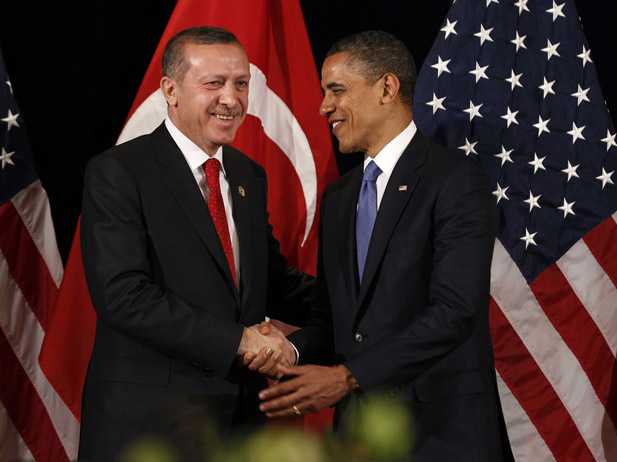by Stewart M. Patrick

U.S. President Barack Obama (R) shakes hands with Turkey’s Prime Minister Tayyip Erdogan after a bilateral meeting in Seoul March 25, 2012. (Larry Downing/Courtesy Reuters)
When it comes to “rising powers,” the BRIC countries—Brazil, Russia, India, and especially China—tend to get the most press. But there’s another emerging player that promises to shape world politics in the twenty-first century with its robust growth, political evolution, and strategic choices. It is Turkey, a country that straddles some of today’s most critical divides: between Europe and the Middle East, between the West and the developing world, between secular democracy and religious piety. Turkey’s evolving might, its geographic position, and model of moderate political Islam make it a natural candidate for “strategic partnership” with the United States. This is the conclusion of U.S. Turkey Relations, a just-released CFR task force report co-chaired by former secretary of state Madeleine K. Albright and former national security adviser Stephen J. Hadley—and directed by my able colleague, Steven A. Cook.
What makes Turkey so special? Real estate, for one thing. Turkey is both a physical and symbolic bridge between the West and the turbulent Arab and broader Muslim worlds. There is little that the United States can do to respond to the deepening crisis in Syria, for example, whether it is imposing sanctions or launching military intervention, without buy-in from Ankara. But Turkey’s significance to Washington is far greater than location. Politically, it offers reforming Arab states like Tunisia, Libya, and Egypt a compelling governance model, proving that a ruling Islamic party (in this case the Justice and Development Party or AKP) can preside over a vibrant democracy that brings sustained growth (including a red-hot 10 percent rise in GDP in 2010) to its people. Turkey shows Islamist reformers that there is indeed a middle ground between strongman rule and sharia law.
In their public comments accompanying the report’s release, the co-chairs were effusive about Turkey’s prospects, with Hadley calling it “one of the five or six most important countries in the world today.” A bit of hyperbole, perhaps, since Turkey currently ranks only seventeenth globally in GDP (PPP), fifteenth in military expenditure, and eighteenth in population. Still, it clearly belongs in the top ranks of emerging powers, as reflected in its G20 membership and its increasing determination to flex its diplomatic muscles—albeit not always successfully, as in the ill-considered 2010 effort with Brazil to head off UN Security Council sanctions on Iran.
Notwithstanding occasional bilateral frictions, including over Israeli conduct, Turkey’s emergence as a diplomatic player is something the United States should celebrate. As the CFR report makes clear, the two countries’ interests are broadly aligned on numerous regional and global issues, from promoting stability in the Middle East to ensuring reliable flows of energy, combating terrorism, curtailing WMD proliferation, expanding international trade and investment, and advancing global development. The challenge is to turn these shared interests into common strategies and coordinated policies, through a more structured, and regularized process of consultation modeled on the U.S.-China strategic and economic dialogue—one of the report’s most compelling (and easily accomplished) recommendations.
The CFR report does not sugarcoat Turkey’s internal challenges and political shortcomings. While celebrating the transformation wrought by the Erdogan government, the task force bemoans the AKP’s sometime authoritarian tendencies, including crackdowns on journalistic freedom and judicial independence. It also cautions that Turkey’s transformation is incomplete, particularly when it comes to the evolving, fraught relationship between the civilian government and the Turkish military. Finally, the report acknowledges that the unresolved position of Turkey’s Kurdish minority may limit its role as a model for multiethnic democracy in the Middle East. The task force recommends that the United States and other democracies deepen their diplomatic efforts to persuade Turkey to “write a constitution that will advance and deepen democracy” on each of these fronts.
Upgrading the U.S.-Turkey partnership is especially urgent when Europe is increasingly inward-looking and internally divided, with nations focused on their own ongoing macroeconomic and fiscal difficulties. The European crisis has put on indefinite hold the question of whether Turkey will ever be admitted to the EU, and, in turn, made many Turks question the advantages of EU membership. In the absence of progress on that front, a U.S.-Turkish strategic partnership offers a way to ensure that Turkey keeps one foot anchored in the West, even as it pursues a more ambitious diplomatic and trade agenda to its south and east. One priority for the United States, the task force suggests, is expanding modest trade between the two countries, by negotiating a bilateral Free Trade Agreement. Another step would be to upgrade its role in the NATO alliance in recognition of Turkey’s stalwart performance in Afghanistan (including commanding the International Security Assistance Force (ISAF) on three separate occasions).
Integrating Turkey into U.S. diplomatic relations would be another forward-looking step by the Obama administration to adjust to the twenty-first century and its changing power dynamics. Having already paid more attention to Brazil and India, and shored up a constructive (though tense) relationship with China, a partnership with Turkey is a logical next step. The world is changing and the United States must adapt its diplomacy.
via The Internationalist » Turkey at the Crossroads (Literally).

Leave a Reply